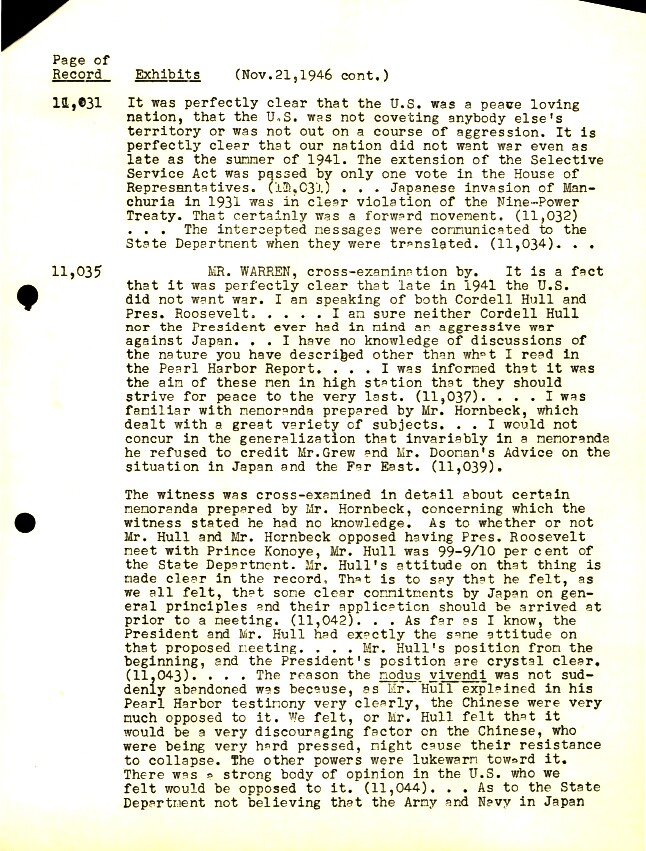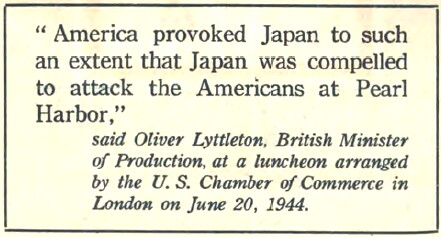The Attack on Pearl Harbor Did Roosevelt know the
Japanese were coming?
|
Links Main Page About Us
| NOTE:
Roger Mansell posted the below D'Amato research based on information he
had at the time
(2002). For those interested in following this controversial topic
further, see the "Afterword" in Mansell's book, Captured: The Forgotten Men of Guam (Mansell's comments in his original draft were edited out). Also see this article by John Lukacs entitled, The Churchill-Roosevelt Forgeries. For additional background information on the Pearl Harbor attack controversy, the following documents show how revisionism has developed in telling the story: What
Every Cryptologist Should Know about Pearl Harbor (2007, Tom
Johnson; NSA)
Was the Attack on Pearl Harbor a Surprise - TV program transcript (1954) Did Roosevelt Know Ahead of Time about Pearl Harbor Attack (2021, LIFE Magazine) Answering the Conspiracy Theories: The Attack on Pearl Harbor (2009, Hilton) - Explains the position of two well-known revisionist authors, Flynn (1944) and Toland (1982) A Deceitful Book: Robert B. Stinnett's book, "Day of Deceit" (Young) - Stinnett (2000) has been one of the most influential among recent revisionist writers Certain Aspects of "Magic" in the Cryptological Background of the Various Official Investigations into the Attack on Pearl Harbor (1957, Friedman; NSA) Very good analysis, with humorous
section (from p. 27) about what Roosevelt logically would have
done to provoke Japan to attack! William Friedman was with the War
Department and
became the chief cryptoanalyst in the Signal Intelligence Service. He
was called "the greatest maker and breaker of secret messages in
history -- the Harry Houdini of codes and ciphers." In 1940, Friedman's
group of codebreakers solved the diplomatic "Purple code" and sent
these translated intercepts to the War Department, intercepts which
would be known as "Magic." He later worked for the National Security
Agency (NSA). For what it's worth as a summary: https://en.wikipedia.org/wiki/Pearl_Harbor_advance-knowledge_conspiracy_theory See also my comments and some assorted documents below.
Pres.
Roosevelt and Sec. of State Hull against going to war with Japan
(from IMTFE War Crimes Trials Summary)  Statement by USN Adm. James Richardson regarding the attack on Pearl Harbor - first page is from the IMTFE Summaries, subsequent pages are from Document #6257 from the trial proceedings exhibits. Of note in the summary is the following: "NAGANO and the late ADMIRAL YAMAMOTO closely cooperated as early as 1936... in working out the plans and issuing the orders for the attack on Pearl Harbor... to destroy the men and ships of the U.S. Pacific Fleet." For a longer excerpt from the Summaries, see Pearl Harbor and war preparations, IMTFE Trials Summary of Proceedings, beginning with Tojo's frank commnents. Some candid commentsDid Pres. Franklin D. Roosevelt force Japan to strike Pearl Harbor?Probably one of the most popular books to promote this theory is "Day of Deceit" by Stinnett (2000). Prior to that was "Infamy - Pearl Harbor and its Aftermath" by Toland (1982). And even before that was Barnes with "Pearl Harbor - After A Quarter Of A Century" (1972). There have been many other books and articles since then -- as NSA's Central Office of Reference Chief commented to William Friedman, "The controversy over placing the blame for the Pearl Harbor disaster will probably never be settled." Much emphasis has been placed on Roosevelt purposely forcing Japan to strike first. What about the US telling Japan to get out of the Tripartite Treaty with Germany and Italy AND to get out of China and Indochina? Japan was the aggressor state; never mind about Pearl Harbor. Why would Roosevelt and other American govt. and military leaders want to leave our Navy as sitting ducks to be destroyed, potentially totally, with thousands of deaths and wounded? It would have been utter lunacy to sacrifice such naval power that was so vitally needed in the Atlantic. Why in the world would Roosevelt have wanted a war on two fronts anyway? If there were any forcing an enemy to attack us, it would have been on the Atlantic side initially, not Pacific. Logically, Roosevelt, had he had prior knowledge, would have secretly sent the fleet to attack the oncoming Japanese fleet, in hopes of decimating them on the high seas rather than around a US territory. Any sneak attack would be handled this way in a normal battle situation, or at least setting a trap for the Japanese fleet to fall into. It would be easier to conjecture on these scenarios rather than on the "do nothing and let them have their way" idea. However, even if Pearl Harbor were not attacked, the Japanese military would have continued with their plans to invade SE Asia -- Shanghai Int'l Area, Midway, Wake, Siam, Guam, Hong Kong, Malaya, the Philippines, Singapore -- and that would have been enough cause to bring the US (and Britain) into war with Japan. Kimmel was frustrated that cryptologist Rochefort did not have intel on WHERE the Japanese fleet was, which was on its way to attack Pearl Harbor. They wouldn't know for sure until two days later, even though intel was gathered from a downed J-plane and a bomber. Halsey was sent on the USS Enterprise to hunt for the Japanese fleet -- to the west and south of Hawaii! They just didn't know. The codebreakers were swamped with traffic coming in and the need for translating all those which they considered viable for security purposes. One big issue was the need for secrecy in order that their codebreaking would not be discovered by Japan or Germany. There was, therefore, limited dissemination of the intercepted messages. But just suppose the Japanese naval codes J-25B et al had been broken prior to the attack on Pearl Harbor. Were the codebreakers obligated to give this info to all, with the possibility of leaks increased and risk their hard work being the cause of the Japanese changing their codes upon finding out that their attack plans had been discovered? Remember that Yamamoto was the mastermind of the attack on Pearl Harbor, a plan that was conceived as early as 1936 (noted above), with definite planning in the works from the beginning of 1941, and practically forced others to agree to carrying out his plan. The Japanese military masters were bent on further aggression in China and SE Asia, no doubt about that. To force the US to join the fight would definitely NOT be to their advantage, hence the desire just to damage the US fleet enough to give them six months or so to finish their invasion plans and secure the resources they needed and build up the military to be able to take on the US when it came to the West Pacific for battle against Japan... and hopefully force the US to capitulate. Japan tried to do that at the end of the war in Operation Ketsugo -- make the fighting (suicide attacks) for the defence of mainland Japan so fierce that the US would sue for peace. The whole theory of the revisionists through the decades since PH rests on this -- the US knew and did nothing about it. The bottom line, however, is that Japan was set on taking over SE Asia to deliver it from "the white man," viz. British, Dutch, French and American. Were those countries going to allow that to happen? Other related documentsNavy Directive No. 1 1941-11-05 - from Pearl Harbor Operations, General Outline of Orders and PlansAdm. Nagano re goals of attacks on Pearl Harbor and SE Asia - IMTFE Tokyo Trials p.11228- HULL Testimony - Pearl Harbor Proceedings Vol 2 p403- HULL Testimony answers - Pearl Harbor Proceedings Vol 11 p5367- TOP SECRET re not revealing J-codes had been broken - from Pearl Harbor Proceedings Vol 39 p332- Timetable of events DEC 7-8, 1941 IMTFE p10543- - includes "Time of Jap Attacks in the Pacific 7 and 8 December 1941" Intercepted coded messages from Japan: Index of Translations and Memoranda Re Pearl Harbor MAR-DEC 1941 Index of Translations Re Japanese Espionage 1941 For those willing to do some very deep research, try The Report and Hearings Before the Joint Committee on the Investigation of the Pearl Harbor Attack (79th Congress, 2nd Session, 1946). The over-all final report of the Committee comprises 15,000 transcript pages with some ten million words, filling 40 volumes of closely printed text. |
